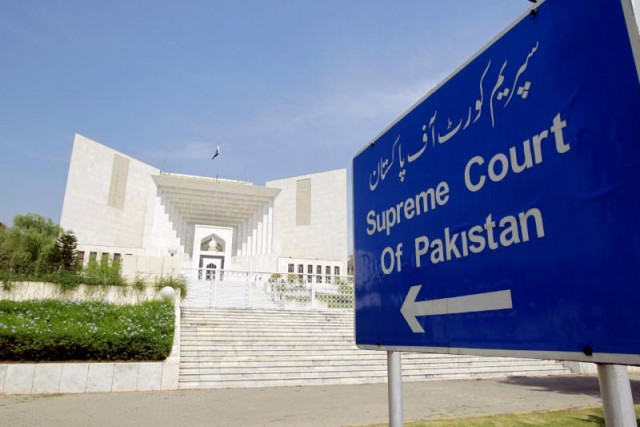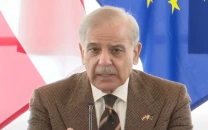British convict challenges Pakistan's narcotics law in apex court
Says proviso to Section 9(c) of CNSA 1997 is violation of Constitution

Karachi Mayor Wasim Akhter, KE officials, local government secretary and others appeared before the court. PHOTO: REUTERS
Khadija Shah, who was awarded life sentence under Section 9(c) of the CNSA, has approached the SC through renowned lawyer Raheel Kamran Sheikh, requesting it to declare the proviso to Section 9(c) as void and having no legal effect for being ex-facie violative of Articles 9, 10A, 14 and 25.
She has requested the court to declare her sentence void.
The applicant contends that strict prescription of death or mandatory imprisonment for life within the proviso to Section 9(c) amounts to legislative judgment and a usurpation of the judicial function vis-à-vis sentencing discretion of a judge.
“On one hand, it is violative of the doctrine of separation of powers, which serves as the bedrock of our constitutional scheme, and on the other hand, undermines the fundamental right to fair trial, embodied within Article 10A of the Constitution, which ought to equally apply to a determination of appropriate sentence by an independent and impartial court, through fair and due process of law.”
The petition contends that the strict prescription of death or mandatory life imprisonment within the proviso is violative of Articles 9 and 14 of the Constitution, insofar as it poses an unreasonable and disproportionate restriction on the right to life and liberty, as well as dignity of citizens.
It says the proviso to section 9(c) is ex facie discriminatory, in that, for the purpose of sentencing, the same fails to reasonably classify between various categories of offenders charged with offences.
“No classification has been made by the said proviso keeping in view the seriousness of various categories of offences. No distinction is drawn between kingpins and mere carriers, habitual offenders and first-timers, the able-bodied and the ailing, hardened criminals and vulnerable actors, as also the offenders having no social ties and those who have dependents to take care of etc.”
It says it is a trite law that if a statutory provision is in conflict with the Constitution, such provision must yield to the superior mandate of basic law, which conferred on the parliament the power to enact laws. Therefore, such a repugnant provision must be treated and declared as void and of no legal effect.
Facts of case
On May 6, 2012, the convict lady was apprehended by the Anti-Narcotics Force (ANF) personnel from the departure hall of Benazir Bhutto International Airport, Islamabad when she came there for boarding flight no PK- 791 bound for Birmingham. On her disclosure, heroin weighing 63.5kg was allegedly recovered from her luggage. The petitioner entered a not guilty plea.
She was 25 years old at the time of her arrest and a mother of two young children – Ibrahim Munir (5) and Alisha Munir (4) and was six months pregnant. She gave birth to her third child, Malaika Munir, in prison during the course of her trial.
As manifest from the proforma of the jail petition, the probable date of release of the petitioner from jail is February 13, 2024. Being British citizens, the children have been taken to the United Kingdom and are in their guardianship of their maternal grandmother, Sulma Shah, a 65-year-old ailing lady suffering from ischemic heart disease, arthritis and joint pain.
The trial court awarded her life sentence and same was maintained by the Lahore High Court Rawalpindi Bench. Now the matter is pending in the apex court. The applicant states that prosecution has failed to prove the fact that the allegedly recovered substance from Khadija’s custody was heroin.
In her defence statement under Section 342 of the CrPC, the petitioner has controverted the fact of alleged recovery, asserted that the bags were not checked in front of her, and denied that the bags produced in court were the ones being carried by her on the day of occurrence.
Only ANF officials were presented as prosecution witnesses, and neither any independent witness was presented nor any justification for not doing so was provided, nor was CCTV footage of alleged recovery from the petitioner was tendered in evidence to corroborate the prosecution’s version.


















COMMENTS
Comments are moderated and generally will be posted if they are on-topic and not abusive.
For more information, please see our Comments FAQ